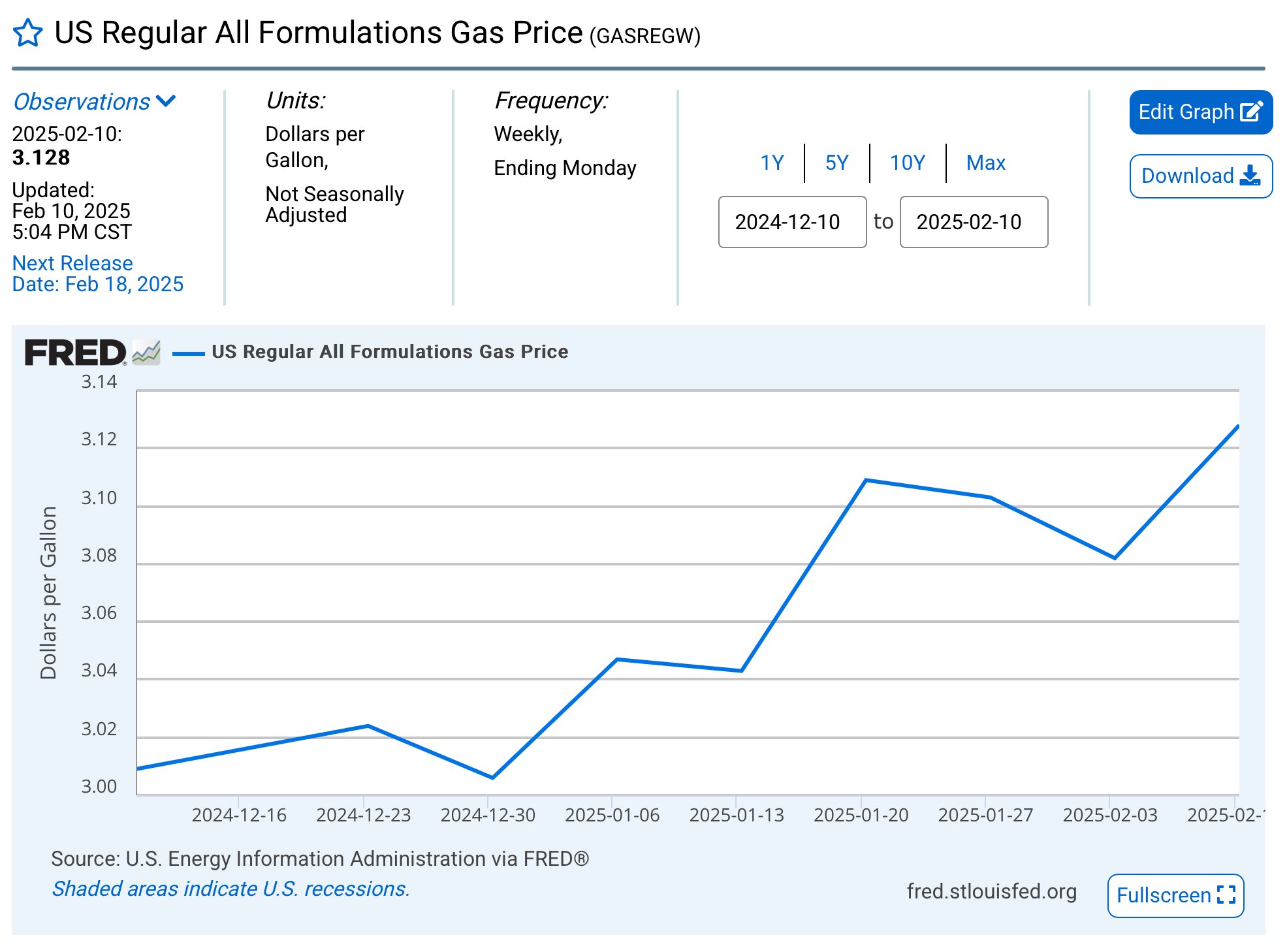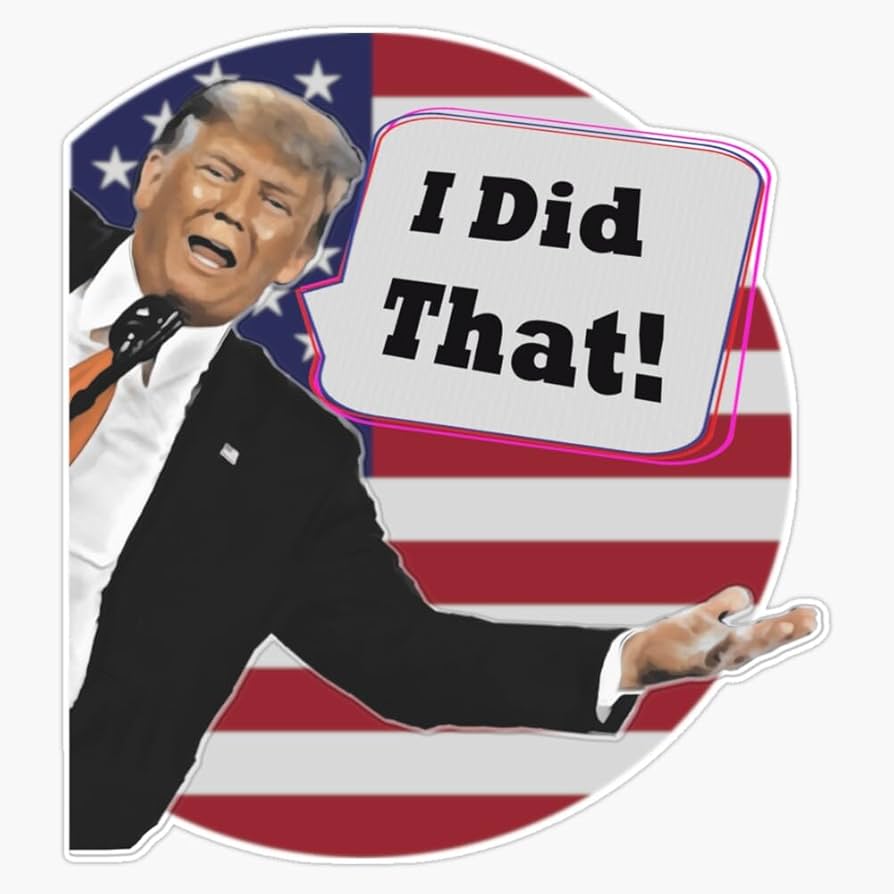Summary
Egg prices in the U.S. have reached a record high of $4.95 per dozen amid a severe bird flu outbreak that has led to the culling of millions of egg-laying chickens.
The shortage is compounded by rising feed, fuel, and labor costs, as well as increased demand and stricter cage-free regulations in several states.
Consumers face empty shelves, surcharges, and limited availability, with some areas pricing cartons at $10 or more.
Prices are expected to continue rising, especially with Easter demand.
So eat fewer eggs…
I probably don’t even get through a dozen in a month. How has this complete non-issue helped put a lunatic in charge?
I don’t think I go through a dozen in a year
This has real “let them eat cake” vibes
Eggs have traditionally been one of the cheapest staple sources of protein for the working poor.
Eggs are used in recipes you wouldn’t even think of. Breads. Baked goods. Fried rice. Pasta.
I have been a Vegan for over a decade and let me tell you, it’s easy to find alternative recipes without eggs.
Not preaching here, btw, just saying that eggs are realy not necessary in most things. Any that very much included cakes and the like.
As someone who has explored this a lot…
Egg replacements often do not confer the same qualities to the recipe that eggs do. Its usually just… off.
Like, how does one replace egg in Egg Fried Rice? It’s a totally different meal.
In receipts that center around eggs (like scrambles Eggs) you will get something that tastes different the Orginal, absolutely.
But in things like cakes? Bread? Pizza? Pancakes? There is simply no need for Eggs and the only reason people use them is because that’s how they are made traditionally.
No, they are used as a binder in baked goods, and provide the proper texture, and loft.
No egg substitute does it the same, and yes, it tastes differently, because it’s not a substitute, like honey can sub in for sugar to proof yeasts…
So, no, the substitutes often don’t work.
Binding, texture and loft are achievable without eggs in baked goods in equal quality, without loosing taste. In my experience. If yours is different then he it so. There no way to prove either or is right or wrong anyhow. If this were the real world I’d invite you to come over and taste some cakes, but allas, we’ll have to resolt to let’s agree to disagree and move on.
Equal quality, only in one’s imagination.
If it weren’t the case, vegan pizza would be palatable, and it’s not.

yea…fucking hilarious how maga sheep all of a sudden seemed to shut the fuck up about egg prices
Make sure at every opportunity that you call everyone of those fuckers a hypocrite, and if you don’t have to maintain any sort of relationship with them, also make sure they know how much of a cunt they are too.

Assuming they can read anything that isn’t boiled down slop from OAN, Fox, or Breitbart.
Yeah, they should change the book into a tiktok.
In all fairness:
-
The tendency to credit or blame the current President for short-term economic conditions, regardless of the actual cause, has been around for a long time.
-
The Trump campaign actively worked to help promote the prior impression, that Biden in particular was adopting inflationary policy. It’s not as if voters entirely came to that conclusion on their lonesome.
The first Trump administration had also adopted inflationary policy, and in general, inflation was considered to be desirable by economists in that it would avoid recession.
Voters, on the other hand, are extremely hostile to inflation. I posted a study with a poll a while back of Americans, Germans, and Brazillians showing that in general, the public would rather have a recession than inflation, even though economists will point out that a country is generally worse-off seeing a recession.
And this tendency to attribute short-term economic effects to the sitting President affects both sides of the aisle. The Clinton campaign benefited from the fact that Bush Senior had had a small recession during his term. This wasn’t in particular because he’d done something objectionable – the policy that he had adopted that contributed to it was probably a good idea, like reducing government defense spending at the end of the Cold War. But…voters, as a whole, don’t have a really sophisticated picture of what’s going on here. And the Clinton campaign aimed to exacerbate that against Bush; in that case, a Democratic candidate benefited:
https://en.wikipedia.org/wiki/It's_the_economy,_stupid
“The economy, stupid” is a phrase that was coined by James Carville in 1992. It is often quoted from a televised quip by Carville as “It’s the economy, stupid.” Carville was a strategist in Bill Clinton’s successful campaign in the 1992 U.S. presidential election against incumbent George H. W. Bush. His phrase was directed at the campaign’s workers and intended as one of three messages for them to focus on. The others were “Change vs. more of the same” and “Don’t forget health care.”
Clinton’s campaign advantageously used the then-prevailing recession in the United States as one of the campaign’s means to successfully unseat George H. W. Bush. In March 1991, days after the ground war in Kuwait, 90% of polled Americans approved of President Bush’s job performance.[1] During the following year, Americans’ opinions turned sharply; 64% of polled Americans disapproved of Bush’s job performance in August 1992.[1]
Prior to that, Reagan’s campaign sought to exacerbate that same short-term attribution tendency against Carter; there, a Republican candidate benefited again:
In the final week of the 1980 presidential campaign between Democratic President Jimmy Carter and Republican nominee Ronald Reagan, the two candidates held their only debate. Going into the Oct. 28 event, Carter had managed to turn a dismal summer into a close race for a second term. And then, during the debate, Reagan posed what has become one of the most important campaign questions of all time: “Are you better off today than you were four years ago?” Carter’s answer was a resounding “NO,” and in the final, crucial days of the campaign, his numbers tanked. On Election Day, Reagan won a huge popular vote and electoral victory. The “better off” question has been with us ever since.
Governor Reagan: Yes, I would like to add my words of thanks, too, to the ladies of the League of Women Voters for making these debates possible. I’m sorry that we couldn’t persuade the bringing in of the third candidate, so that he could have been seen also in these debates. But still, it’s good that at least once, all three of us were heard by the people of this country.
Next Tuesday is election day. Next Tuesday all of you will go to the polls; you’ll stand there in the polling place and make a decision. I think when you make that decision, it might be well if you would ask yourself, are you better off than you were 4 years ago? Is it easier for you to go and buy things in the stores than it was 4 years ago? Is there more or less unemployment in the country than there was 4 years ago?
Unless and until administrations figure out how to effectively communicate that they haven’t done something wrong just because there is some characteristic of the economy that is negative – and do so even when their opposition has a strong incentive to communicate that they have – they are probably going to be vulnerable to this.
While it’s unfortunate that voters do this, it’s a hard problem to solve. You’re not going to go out and provide everyone in the US with an understanding of the economics behind everything that happens in the US. Much as I would love everyone out there to have a deep store of knowledge in many areas, some of how society has made gains is to accept that societies are not going to be made up of a bunch of generalists, but rather to have specialization of labor. If we have to expend time to teach every person economics, it’s time that they can’t be learning other things, and if they don’t use economics in most of their life – even if, gosh darn it, it would be nice if they do around elections – then it’s taking away from a skillset that may be more-critical. And, more-broadly, the general public certainly cannot come up to speed on every policy that the US government deals with – the scope is far too large.
We’re working on trying to get the general population able to understand graphs; the US isn’t even particularly strong here among countries with a similar level of economic development:
kagis
https://3iap.com/numeracy-and-data-literacy-in-the-united-states-7b1w9J_wRjqyzqo3WDLTdA/
Numeracy rates in the United States are middling compared to other countries surveyed, and much lower than numeracy leaders like Japan, Finland, and the Netherlands (“Benchmark Countries” above, per src). For 2012–2014 results, a typical US Adult’s score was 257 (src), putting them solidly in the Level 2 range (226–276 points, src, pg 71). Just 39% of US adults tested as proficient (level 3 or higher), compared to 61% for the benchmark countries (src).
So if just four in ten US adults perform above Level 3, then six in ten struggle to “recognize and work with mathematical relationships, patterns, and proportions expressed in verbal or numerical form; and can interpret and perform basic analyses of data and statistics in texts, tables and graphs.”
“These results are another signal that many Americans struggle with the most basic of math skills,” says NCES Associate Commissioner Peggy Carr (src).
Trying to convey the issues if you don’t have the skillset necessary to even read some of the basic visualizations that one might use is not easy.
And this isn’t an area where you can go and say “well, we’ll just go use some of our people who do have that expertise”, the way we might for many tasks. Voters are everyone. So if what you want is an understanding of the issues behind policy, then it’s going to have to go to everyone.
My guess is that any sort of successful solution is going to involve finding some kind of entity who is both able to gain the trust of American voters as being objective, who they will choose to listen to rather than someone who is maybe saying what they want to hear on other matters and giving them a conflicting take on economic matters. One party is probably going to probably have an interest in trying to get them to not listen to such an entity. To quote Michael Gove, who was trying to get the UK to Leave in the Brexit fight, despite (most, outside of one notable but small group) economists recommending against it:
Michael Gove touched a populist nerve. Leading up to Britain’s referendum on membership of the European Union, he delivered a soundbite that gained wide currency.
Gove, then Lord Chancellor, declared: “I think the people of this country have had enough of experts with organisations with acronyms saying that they know what is best and getting it consistently wrong
If you can’t do that, then either you are facing just putting up with (1) voters making judgement calls that probably aren’t fantastic based on the economic state of affairs, or (2) actually doing what they want – which is often not a good idea, like tamping down on inflation at the expense of producing a recession – or (3) doing what Trump’s done during his first term in office and which I expect he’s likely to do again, which is giving them political theater to give the impression that the policy they want (e.g. on protectionist trade policy for manufacturing) is being adopted while not actually doing so.
The problem with the political theater route is that it means that the public isn’t acting to keep the administration on a sane policy route any more – it means that the public wants to go make policy that is not a great idea and now the administration is helping encourage those same views, which may increase political pressure and have negative impacts on actual policy down the line. And creating a false perception means one of (1) suppression of the press (think, oh, China or Cold War Soviet Union or something), (2) getting people to self-segregate into a limited number of echo chambers willing to put out controlled messages (hard to do with social media, which has democratized mass media, where anyone with a social media account can inconveniently point out that the administration ain’t doing what it’s trying to give the perception that it’s doing), or (3) trying to flood the press with other messages to keep some people from seeing discussion that the administration isn’t doing what supporters are wanting it to do (think Trump administration).
I like to read, but damn. I would need my glasses and a cup of tea to even get started with this.
-
I was expecting a whole raft of letters and op-eds in my local corporate rag (Denver Post) that more or less spew the same old “give him a chance to pivot to being presidential, you guyyyyyyzzzzzz” and “we had to put up with Biden when he was in office and you didn’t see US protesting like this [1]!!! boo hoo hoo” type of stuff for the next several weeks months after he took power. I don’t recall seeing too many of these. Weird.
[1] The fact that these assholes could act like they had to “put up with” Biden when neither Biden or anyone in his administration was trying to target entire demographics and cause “pain” to the American people, etc…completely unlike what donvict is doing. Nevermind that they can sit there and gaslight about not protesting. Protesting is a completely valid and highly American and patriotic tradition - what THEY fucking did when they lost was to throw an insurrection that was run in parallel with a fucking coup attempt.
They are all now experts on the effects of culling chickens for bird flu.
So covid was a hoax but bird flu and measles are real. I’m not quite following.
They might remain real things right up until the moment they have to change one IOTA of their own lives, or if they think it’s making donvict/fElon look bad in some way.
I will never forget how many younger right-leaning/red-pilled types did this collective shrug about Covid, by the way: “that’s something that only impacts old people who just need to die anyway and fat people and/or diabetics, and that’s their own fault, so I should not have to adapt one little bit”. Many of these people in the same generations that a lot of people are telling me are soooo much better than every other generation that ever existed.
Given the cost of everything including stickers, maybe it might be good to have a printout of this and take it everywhere, then take an image with this held up next to the prices.
Also, in Bronzo the Clown’s America, I might get deported or sent to Gitmo over defacing some gas pump with…stickers.
Is this from that time he stared at the solar eclipse without eye protection?
Yes.
I still wonder if him staring at the sun was more from him just being a complete idiot, or a “imma gunna show them what a MAN I am! This is some real fucking leadership, I tell u wut!”
Holy hell that is hilarious on multiple levels.
deleted by creator
Technically the eclipse which you aren’t supposed to look at. Because you risk going blind.
Fucking idiot.
Yup
deleted by creator
Even better, it’s him staring at a solar eclipse
This is fun

Thanks, trump!
$8 here in the supermarket, but 2 dozen for $5 at the farm across the street from my SO’s parents
$10 for a dozen here. But still $7.69 for two dozen at Costco if you can get to them before they sell out.
$8.49 for two dozen brown eggs at Costco in Colorado (Denver Metro)
Bruh. I just paid $11.83 for a dozen (granted they were organic pasture raised but still)
“i just bought the always high priced ones at a high price!”
Amazing.
They used to be $6 🤷♂️
I just saw an 18 pack for $14.75 yesterday at my local grocery. A dozen is $10, and that’s for the white eggs, not the brown ones. Luckily we have a Grocery Outlet that had a dozen for $7.50, but holy shit.
2 packs of 18 used to be $7 bucks. Now one pack of 18 is $8.
I’ve stopped buying eggs.
Just yesterday my friend texted that his local bodega in the Bronx is selling $1 loosies or $10/dozen. Fucking egg loosies. What’s next? Egg dealers on Gun Hill?
That’s why I would never shop at a bodega. “Let’s make paying more feel cool and trendy.” It’s a fucking 7-11 with incense.
NYC doesn’t exactly have massive supermarkets on ever highway intersection. They are convenience stores that fill a need.
Bodegas are small businesses that are usually very entrenched in the community. This isn’t extortion. It’s a way to make a few eggs affordable. My criticism is of the need for the loosies in the first place.
I agree with your criticism for the need loosies In the first place, But there has been a rising trend where Bodegas In communities, like the Bronx, have taken advantage of an influx of higher earners. If they raise the price for them, they raise the price for all. This is just another form of hyper focused capitalism.
Ah yes. Privately owned corner stores. The ultimate in hyper focused capitalism 🙄
The irony of that guy recognizing that the only war is the class war and then going after …checks notes… poor immigrants trying to make a living in retail.
I’m guessing you don’t know what hyper-focused capitalism means.
It doesn’t sound like that person has ever been to a city
It’s so common for tourists to see higher prices than they’re used to and assume the place is a rip off. They have no idea how insane the rent for a tiny shop can be. Meanwhile, they’ll have no problem dropping $30 for a ‘value meal’ in Times Square.
That’s not why they do things like that, but stay ignorant.
Feel free to explain you opinion.
but stay ignorant.
I don’t think that works as well on people as you might think. Perhaps you’re the one who has remained ignorant by dismissing the opinions of others who may have very convincing arguments.
But hey, stay ignorant.
There is no opinion. There is a fact why stores sell loosies, and it’s not “to be cool”. That’s the dumbest most out of touch thing I’ve ever heard.
It’s because people can’t afford the whole thing, so they charge a premium for a single. If they gave a shit they’d just charge 1/12th of a carton of eggs, instead of gouging poor people. 17¢ might sound like a ridiculous amount to complain about to you and I, but if a person cannot afford a $10 carton, I’m guessing that money matters.
Here. I found an article on it. You won’t hear a corporate manager making the same considerations.
Radhames Rodriguez, owner of Pamela’s Green Deli in the Bronx’s Morrisania section, said the idea of selling loose eggs came to him after seeing customers leaving full cartons on the counter because they couldn’t afford it.
Hoping to help customers in the community, Rodriguez now sells three eggs for $2.99, which he says is a better than paying at least $12 for one carton.
https://www.cbsnews.com/newyork/news/egg-prices-bronx-bodegas/
OP isn’t going to read that. Prices=Bad to them.
“Yo, I got them loose ovoids!”
Refrigerated trenchcoat sales on the subway.
Or just sell the non processed eggs that’s easier since they don’t need to be refrigerated
You see the Daily Show sketch?
No, did they do that?
Got ya free range here. Extra large. Whites and browns.
French ticklers for me!
People will be selling black market eggs in back alleys soon.
There was a news story a few days ago about somebody heisting 144,000 eggs from a delivery truck in PA.
Buy the ticket, take the ride
This was going to happen under anyone who won, tbh.
Eggs are not super expensive in Canada despite also having issues with bird flu.
Canada structured their industry differently via regulation such that the impact of a bird pandemic wouldn’t be as damaging.
My eggs are cheaper in Canadian dollars than your average is in American dollars, despite the exchange being like 1.42 cdn per USD.
Okay and what does the price of eggs in Canada and their structure have anything to do with the price of US eggs and their structure?
A few months is not enough time to restructure the entire egg industry in the USA.
The point is that better leaders would have not let this happen, it wasn’t inevitable.
I don’t disagree with that. Hence this was going to happen regardless of who won.
I think the point was we’ve been heading in this fucked direction for a long time while everyone else has been building robust regulations.
Meanwhile, my small backyard chicken flock (smallish coop with an enclosed and roofed run) eats the organic trash from our kitchen, and then they give me between 5-8 eggs per day. Literally, I picked up 7 eggs yesterday even though nights are around -10 degrees C. It’s a miracle.
Why are you giving trash to your chickens?
I really hope you’re vegan otherwise your ignorance on this topic is pretty staggering.
Good job on answering a plain question like an asshole, give yourself a pat on the back for a well done job.
I just asked why he is giving what he calls refuse, when most people with chickens gives them corn, grain mix and mealworms.
That’s not a miracle that’s literally just how chickens work.
You friend, ARE a miracle. There’s only one of you, only one known planet in the entirety of the known universe where you could even have come to be. Same for the chickens. Miraculous!!
I wish! It was 60 F here last night and these ladies still ain’t got enough daylight to start laying.
USDA’s puts them at $7.74/dozen based on futures and project to get to nearly $10 this year. Given eggs can often be loss leaders, actual prices might not match contract prices everywhere, but stores trying to bring in customers and increasing other prices to compensate means looking directly at consumer egg prices might be misleading.
loss leaders
Hardly.

Curious when that cost is based on. Given future contracts are often purchased in advanced, those prices could reflect prices from months ago, when the wholesale market price was 1/3rd of the current price. Guess still not technically a loss leader if they price current inventory based on what they are paying for future inventory though.
Interesting, I have already seen them for $10.48 a dozen
Yeah, local prices can very a lot. My local prices are pretty similar to the ones in this article. But some places have been over $10/dozen for some time.
I will say I am in a rural area, and am within a state of the largest poultry production. These numbers are insane for that, and makes me think this is being incorrectly reported somehow.

The background should probably be the Russian flag.
Swastika would be more accurate.
Is it day 1 yet?
No, flag of Putin’s party
Where are people getting these numbers? Eggs have been above $7 for months
Average across the nation. They’re $12/dozen here.
Very cool resource! Thank you! I’m looking up all sorts of stuff in there
Canned white tuna is now cheaper with more protein per dollar than eggs where I am.
Would you mind saying if you’re coastal? It would be extra funny if you’re in Nebraska or something.
Could be Colorado. They’re over $12/dozen. Batshit crazy here.
I live in a Philly suburb (sorta coastal) and they’re $10 a dozen right now.
Neighbor just brought over a dozen since they cannot use all theirs. We may end up passing some on, since eggs take a long time to get used up in my household.
I don’t want this to be the new toilet paper, at least not at my house. :)
Plus an extra 2000% of your RDA for mercury!
Which they just had a recall on.
Prices in Ireland for 12 eggs are €3.75 for free range or €2.70 for barn
How much for you to paint them to look like toy eggs and ship to the US?
Prices here in Norway are… uh, I don’t know. I bought a large pack yesterday, and the checkout total was about what I expected.
Just a reminder, if you’re like me and never even look at organic stuff, check the organic eggs. They’re cheaper at my store right now.
Why not look at organic stuff?
Because being anti-GMO is hateful bigotry. Things like golden rice have already saved and enhanced millions of lives, it’s just that the benefit goes to poor people with dark skin.
I never look at organic stuff because while they may legitimately avoid pesticides and other chemicals, there is no scientifically demonstrated benefit to organic produce, and it costs a lot more.
There’s an implication that organic is healthier and just better, but there’s no evidence of that.
Like I could buy milk from cows that have nice names and listen to music while being milked, and that might make me feel better, but the nutritional quality of the milk is the same.
And in some cases, the flavor is dramatically different for better or worse. For example, I cannot stand organic bananas, and I eat bananas almost every day. Something about the organic ones just taste so off to me. Can’t really pinpoint why - it’s been a while. But it’s stuck with me ever since I tried one.
Yeah.
Organic produce is often inferior, which kinda stands to reason because all the tOxIc ChEmIcALs are added to improve the product.
I mean, it’s obvious that adding fertilizer (phosphate) is going to produce bigger plumper tastier fruit and vegetables?
I buy organic cauliflower not because I prefer organic but because it’s all my local green grocer sells. It always has these little green caterpillars. I don’t let that bother me but I have noticed that it doesn’t seem to keep quite as long. Whether that’s because the caterpillars munching bits of it makes it deteriorate quicker, or it takes longer to get from the farm to me, or it’s a different variety, I really don’t know. It’s def not objectively as good as the non-organic version.
As an aside, Bananas (like most fruit and veg) has been heavily domesticated by humans and the original from the pleistocene was pretty awful from the sounds of it with much less edible flesh and much bigger and harder seeds.
Usually organic stuff is 2-4x more expensive around here, so my eyes tend to slip right over them.
:(






















